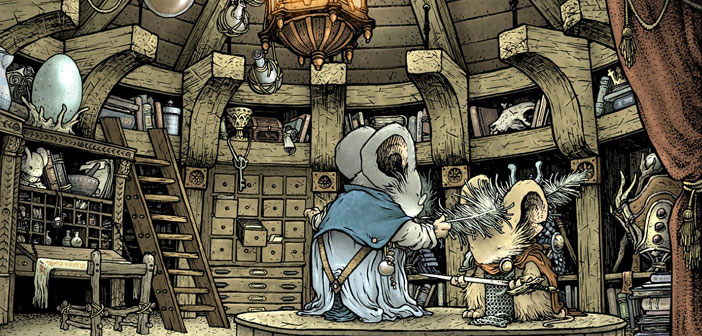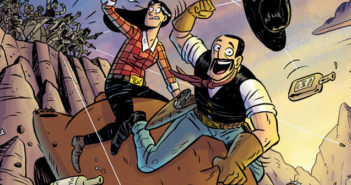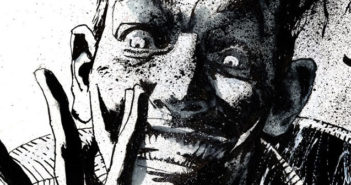There is no contemporary fabulist at work today greater than David Petersen, creator of the breathtaking Mouse Guard comic book series. What J.K. Rowling did for children’s literature with the Harry Potter series, Petersen has accomplished himself with Mouse Guard: he’s created on of the purest all-ages stories to date within the comics medium.
I recently had the opportunity to chat with Petersen about Mouse Guard; past, present, and prosperous future.
Steven Surman: Considering the current success you’re enjoying for Mouse Guard, what did you expect the book’s fate to be when you initially conceived the idea?
David Petersen: Heavens, no. When I conceived the idea I was in community college living at my parent’s house. The idea of doing a published book was something so far away from being a real possibility for me at that point. Years later when I actually started work on the first issue, I had a feeling that it was a good project and had some potential, but I thought I was going to be able to build up to a small group of very loyal fans. So I am very glad that the small group of loyal fans hopped on board with that first issue and every issue after that they welcomed in new readers.
SS: What kind of audience have you had in mind over the years while creating Mouse Guard?
DP: I have to walk a fine line. I now think of Mouse Guard as a true all ages book, which both adults and kids feel they are being targeted with. When I started on Mouse Guard I hadn’t thought of it as an “all ages” book, but only in the sense of that label. I was writing and drawing the kind of book I wanted to read. Something that played to my sensibilities as an artist and storyteller, and it happened to be “all ages.” I remember being asked at a convention early on: “Who is the audience?” I answered: “Anyone.”
SS: You do it all for your comic book: story, writing, art, colors, inks, etc. Because of all the responsibilities you have to turn out a successful book every other month, what is your creative process like?
DP: When I start a series I work in outline form. I tend not to type until I have a collection of scraps of paper with ideas scribbled out on them. The series outline will consist of what the major events are in each issue and where the issues stop and start within the story. Then I’ll start on an issue by making an outline or list of the major events of that section of the story. I’ll estimate how many pages it will take me to tell that portion (which is sometimes planned out with thumbnails and sometime merely guesswork). When my list adds up to 23 pages, I start on the artwork.
When I work on the artwork I try and layout pages in groups, often pairs of facing pages. I’ll lock down what I think the most important panel will be and give it a shape that suits it, then work the rest of the panels around it. Once I get the pages laid out, I’ll pencil and ink them, then scan and perhaps color them before moving on to another set of pages where I start from the layout stage again.
The dialogue sometimes comes up while I’m penciling, sometimes when I’m outlining, sometimes when I’m in the shower, and sometimes when I’m pounding my head on the monitor displaying finished colored artwork with mice speaking with empty word balloons.
SS: A character that I’m personally attached to is Celanawe: he follows in the classic tradition of epic storytelling by filling the archetypal mentor role, specifically for young Leiam, who at the end of Winter 1152 takes up the Black Axe mantle. What inspired the creation of Celanawe’s character?
DP: Celanawe was originally a homage to a friend of mine that liked playing gruff dwarves in D&D, but after just one drawing he became a different character. He was still gruff and battle-worn, but the character read as more of a wise teacher with a history than an ale-guzzling and brutish Saxon. Then the idea of Obi-Wan from Star Wars came to mind. I wanted him to be an awesome mentor, but one that you had the idea was even more outstanding back in his prime.
SS: While on the topic of Celanawe, what can you reveal to us about your upcoming Black Axe story arc? Will this be the tale where we discover Celanawe’s own journey from mouse to mentor?
DP: In Winter 1152, Celanawe promises to tell Lieam the tale of when his paw first touched the Axe. The Black Axe will be that story, where we see Celanawe come into his own and his rise as the Black Axe and his sacrifice to do the greater good.
SS: Alongside the Black Axe arc, the Legends of the Guard spin-off miniseries will also be released in 2010, in which you’ve hand-selected a small group of creators to craft their own Mouse Guard tales. What can fans of your work expect from this project?
DP: A lot of amazing artwork and fun stories! I’ll still be providing covers and pages in between the guest creators to bridge the stories together. It will be a four-issue series for now, [and]if the sales go well, we hope to do a second series. The guests are lining up and it’s getting harder and harder to say: “I’m sorry; we are full.”
SS: The creation of Mouse Guard is clearly something you hold close to your heart. How difficult has it been passing the story off to other creators?
DP: When Jeremy Bastian and Mark Smylie turned in their pinups for the first Mouse Guard series, I was so excited about what they had done; I told them both that they could play in my world anytime they wanted. That was the seed of Legends. Since I’m handpicking the creators involved, it’s easier to hand it over. Part of the setup of the book also allows for deviations from cannon and personal style input from the guests—these are the legends and stories the mice tell, and we know those rarely are complete truths.
SS: You certainly made an interesting leap from comics to role-playing games. How did the Mouse Guard RPG come into being?
DP: There had been some fans asking if I played RPGs right after the first few Mouse Guard issues came out. I was amazed to see fans had picked up on that from just reading the stories. So it was an immediate possibility in my mind. Luke Crane came forward as a candidate for writing the game. He and I sat at an Archaia dinner after a convention and talked about gaming styles and methods, things we liked and didn’t like about certain systems, etc. We ignored everyone else at that dinner and I decided Luke was the right guy for the job.
And he did a wonderful job on the game. He put me to task to flesh out the world more and give him boundaries to work in. I also provided over 60 new illustrations. But I think its Luke’s work on the game and layout of the book and the book design that make it shine.
SS: Would you like to see Mouse Guard span off into even more mediums, such as an animated film or a video game?
DP: Sure. We are already talking to a studio about a Mouse Guard film. I am really liking what they have to say, and I think they are the right people to work with. I also have some definite ideas about how to approach video game design for Mouse Guard as well. All that being said though, my focus will always really be the stories and books themselves. I have a lot of work in Mouse Guard planned out and I want to make sure that the mice I draw are my first priority.
SS: Let’s end on a light note: do you have a particular character that you’re personally fond of, even a favorite?
DP: It’s a bias I try and avoid, but sometimes it gets the better of me. I have a soft spot for Saxon.
To learn more about David Petersen and Mouse Guard, please visit www.mouseguard.net. To learn more about Archaia and the books they publish, please visit www.archaia.com.
This interview originally appeared on Broken Frontier.




